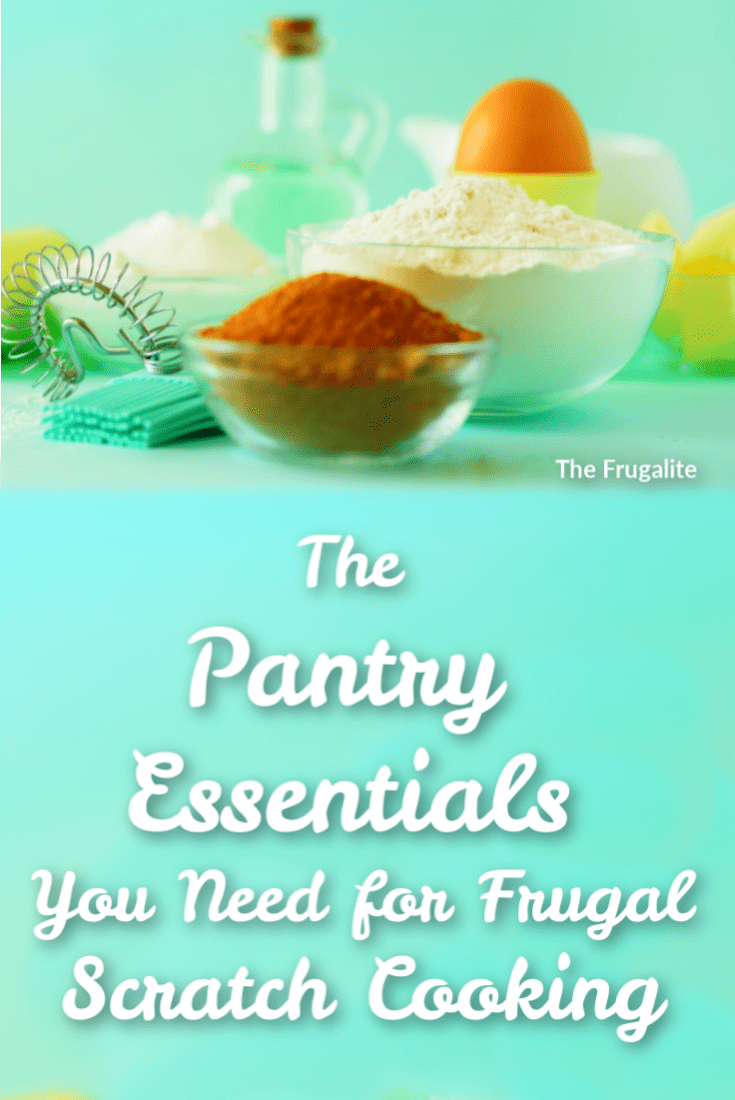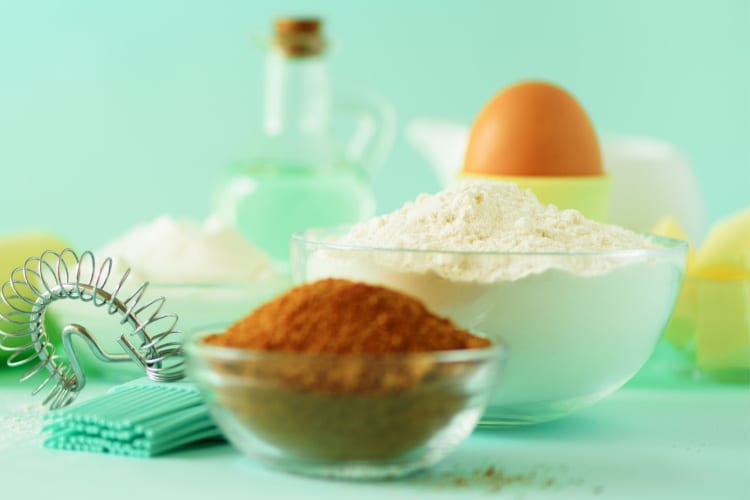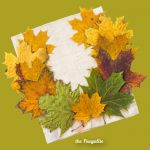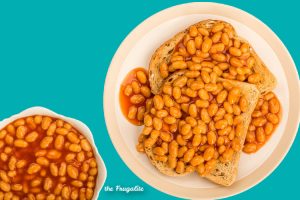(Psst: The FTC wants me to remind you that this website contains affiliate links. That means if you make a purchase from a link you click on, I might receive a small commission. This does not increase the price you’ll pay for that item nor does it decrease the awesomeness of the item. ~ Daisy)
Does your pantry contain all of the basics for scratch cooking? There are 25 ingredients that you need in your pantry at all times to cook from scratch.
More and more people are reclaiming the lost art of cooking from scratch in an effort to save money and avoid the trend toward processed food. A good pantry should have everything you need to whip together a pie, a loaf of bread, a casserole, or a batch of biscuits with no trip to the store required.
This is a list from my book, Prepper’s Pantry, of the things you need to go with your whole foods to turn them into delicious meals, so you won’t find things like canned goods, flours, grains, meats, or veggies. These ingredients are the supporting actors to the starring roles. If you like to think ahead, be sure to acquire these items in multiples – you should never run out of them. Many of these basics can be purchased in large quantities. One of my favorite destinations for pantry basics is Amazon, where I purchase yeast, aluminum-free baking soda, and other building blocks of a scratch pantry. I have also acquired 50-pound bags of organic sugar at Bulk Barn for a reduced price.
What basics do you need for scratch cooking?
To build your stockpile, look through your cupboards and see what you use the most. Every kitchen will be different but below are my most-used items – the ones that I search out and buy in bulk. Links are for high-quality versions of these items, as opposed to store brands that could come from more questionable sources. Feel free to select whatever version you prefer of the items – just be sure to load up and get prepped! 🙂
Baking Items
- Baking soda
- Baking powder
- Yeast
- Cocoa
- Powdered milk
- Flour
- Cornmeal
- Powdered egg
Fats
- Olive oil
- Coconut oil
- Shortening
- Butter
- Lard (we get this locally rendered)
Sweeteners
- White sugar
- Turbinado sugar
- Muscavado sugar/brown sugar
- Honey (I get this locally in bulk)
- Molasses
- Maple syrup (mine is a yearly Christmas present from Canada)
- Confectioner’s sugar
Other
- Salt
- White vinegar
- Apple cider vinegar
- Balsamic vinegar
- Black pepper
- Herbs and spices
- Cornstarch (please consider organic for all corn products)
- Lemon Juice
- Cream of tartar
Are there any pantry basics I’ve missed?
This list is of the things that you need to turn your other stored food into a delicious meal. Are there any basics in your cupboards that you use all the time? Please share them in the comments section!












23 thoughts on “The Pantry Essentials You Need for Scratch Cooking”
Great idea for a new site!
You must be thinking that we should all have the following: flour, cornmeal, couscous, pasta and rice. Instant potatoes are good to have to thicken some soups or stews. A can of pinto beans liquified in a blender makes a creamy addition to soups. In a spicy dish like chili, cornmeal sprinkled in works well as a thickener. For those who haven’t mastered pie crust, flour tortillas make a great “crust” especially fried in butter.
You can also used ground flax seeds as an egg replacement in baking. I believe it’s 1 Tbsp. flax seed to 3 Tbsp. water. Let sit for a few minutes and then add as you would a regular egg.
Cream of tartar. Among other things, you can add it to baking soda (long shelf life) to make baking powder (short shelf life)
Gluten – add to all purpose flour to make bread flour
Buttermilk powder
Himalayan, Celtic, and other non-white salt
Bouillion (for soup)
I was going to second the cream of tartar. Can’t you make powdered sugar using the cream of tartar too?
Molasses can be used to make brown sugar.
Baking cocoa can be used to make chocolate.
Love your websites, Daisy!
Powdered sugar is made with granulated white sugar and cornstarch.
Hi Daisy,
I live on one of the Gulf Islands near Vancouver, Canada and have been through days of power outages, ferry failures, and trees down. My pantry is essential to my family’s well-being.
I have on my “essential” list in addition to yours:
skim milk powder (rather than whole milk powder),
wax paper,
tin foil,
Vodka because it can be used to make extracts,
chocolate chips,
canola oil,
cinnamon,
whole cloves,
oatmeal,
vanilla beans (for making vanilla extract),
raisins, and
walnuts or almonds or whatever is on sale.
With what is on your list and mine, someone can make oatmeal chocolate chip cookies, raisin bread, cinnamon buns, simple granola, a cake, muffins, scones, and all kinds of treats. Life is much less grim when you can sit down to tea or coffee with a muffin.
Not essential but I always have coffee and tea in my pantry. Dehydrated eggs have been useful but I am not using them up very fast. My neighbours sell eggs.
Congratulations on a well-designed web-site.
Thank you so much!
I have everything on your list and much more. I almost never use cream of tarter.
A well stocked kitchen and pantry makes cooking and baking easier. I’ve seldom used mixes but if I do it gets changed, improved on or just appreciated for saving time. Scratch cooking is good, healthier, and usually cheaper. Raising 4 boys and a girl made penny pinching a necessity.
I enjoy your site and articles
Thank you! I think cream of tartar is something some folks swear by and others never use. I never had it until recently when readers kept recommending it and it certainly has proven useful. 🙂
I have old cook book from my mother that had old scratch recipes,. Many used cream of tartar because baking powder got old or before they even had it! JR
Thank You I hand copied your list and others additions to my survival/camping recipe card file. The only place I cook is over a campfire.
this is great info! especially the substitution ideas!!! please list some more soon….love your ideas and sight Daisy, keep’em coming!
Being a true southerner no list of mine would be without Grits. I’ve enjoyed all the books of yours that I have purchased. I’d encourage all your readers to add them to their book shelves too.
Everyone says ‘canola oil’. I have friends allergic to canola oil. Use something else, please.
You can use any oil you choose. 🙂 This is a list of suggestions that you can adapt to fit your needs.
coconut for chocolate no-bake cookies.
I think we must have been broke when I grew up and i didn’t even know it! We had all these things and cooked /grew virtually everything from scratch. My house has always had all these things in pantry. I suggest coconut oil for keeping without getting rancid for years. Spices ,from scratch recipe books. By the way I canned my way through Daisy’s “The preppers canning guide” this summer, and it has wonderful ideas for shelf stable food that only needs heating up. The recipes are great! I am now an expert with a pressure canner. You will love the book. JR
You need to make your site PDF accessible. It doesn’t do me any good because I don’t have a way to print the articles.
One item I didn’t see mentioned above is a kitchen countertop grain mill that can be either hand cranked or motorized. That way you can store many kinds of grains, nuts and dried beans for decades. The advantage is to be able to crank grains (one or multiple kinds) into flour for only as much as you immediately need. That lets you select gluten-free grains to work with if that’s relevant for you. That also saves you from the very short life of stored flour. Even cleaned and then dried beans (even stored for decades) when ground into flour can be added to boiling water for as little as 3 minutes before becoming edible. The savings of your time and the extreme savings of stored cooking fuel (especially during a long term power outage) can be enormous. Oh, you can also grind selected kinds (or combinations) of nuts to make nut butter. Solar cookers are notorious for problems with intermittent cloudiness but the ability to use them for very short time recipes can be very helpful. My grain mill is a Country Living brand with the optional bean auger but there are several other brands on the market.
Oh, just a bit of history. There were hand cranked grain mills back in the pioneer pre-electric days of this country. When the supply steamboat Arabia went down in the Missouri River in 1856 … excavators in the 20th century found such a grain mill in the boat’s inventory of supplies intended to be sold to pioneer community general stores. I saw it in the museum of those recovered artifacts in Kansas City many years ago.
–Lewis
Regarding making PDF copies of such articles as this … the process can be as simple as either selecting a browser with a built-in option to save web pages into PDF documents into a folder of your choice on your computer OR selecting a browser for which a “Save Webpage As PDF” extension can be optionally added. No need to worry Daisy at all.
–Lewis
All good suggestions! As someone else mentioned, A grain mill opens up other food storage opportunities. Wheat will store forever under appropriate conditions.I make cornmeal from popcorn. And sometimes I actually pop the popcorn for a snack. 😉 Ground pinto beans will make almost instant bean dip with boiling water and the appropriate
spices, or “refried beans with the addition of lard or other oils if one doesn’t ” do” lard.
I’ve recently started sprouting wheat then drying the wheat to grind into flour. It makes a very pleasant difference to the taste of homemade bread.
I also keep dehydrated onion we grow and dry ourselves, and garlic. I don’t preserve garlic. It stores a long time, and we always have more than we can use. Ghee is also good and can be made at home.
Cornmeal from popcorn? That’s a fantastic use for old popcorn that’s lost its pop! I’ll have to remember that one. Also might be a good thing to do if a bunch of unflavored popcorn is found on sale.
One of my pantry favorites is canned Nido Fortificado. It’s a vitamin enriched powdered milk which is quite shelf stable though it contains some fat, which can be good for baking or nutritional reasons. It tastes pretty good, is great for baking, and can be used to make yogurt if you have yogurt to start it. I always put it in chowder and it gives a lovely taste.
Grits, oats, pinto beans, black eyed peas, rice, red lentils (I’ve tried and tried the green/brown ones and I just can’t stand the texture; red lentils dissolve in the soup), pasta, bouillon, cheese powder, ghee, dried hash browns, and ramen. Despite what purists say, if I’m hungry, I’ll eat it.
Also, a note about powdered sugar: I’ve never been able to grind granulated sugar fine enough that it didn’t taste gritty.